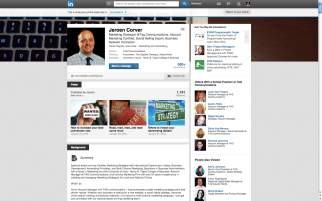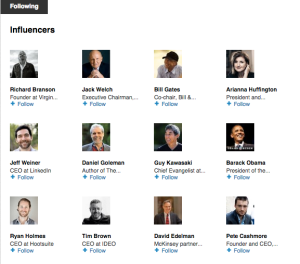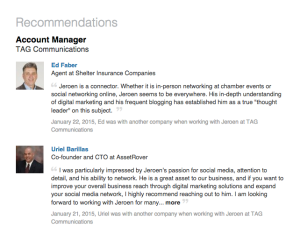There is no B2B or B2C, only H2H (Human to Human) – Bryan Kramer
Consumers do business with you because they like you as a person, they like your level of service, and they like your products and/or services. As the modern consumer goes online to research, it is key for any sales person to reach them in the research phase. In this stage you have the ability gain interest in you and your company and you can educate and direct your consumer towards your products or services.
94% of consumers start their research online. In this stage of the buying journey they go online to visit company pages, check social media sites and read blogs that provide them with valuable insights to remove any risk and confirm their buying decision. In this stage they will eliminate 70% of potentials service or product providers and end up talking to a select few. Any traditional sales organization that focuses on the decision phase will only have a 30% chance being selected as a preferred provider. Companies that are able to provide the most valuable information to support the buying decision will win the trust of the consumer and therefore also win the sale.
 In order to reach these potential buyers you have to be online. Social media platforms such as LinkedIn, Twitter, Facebook, Youtube, Pinterest, and even your own personal website are a great tool to create your own personal brand online. Social media is the purest form of online communication. You can share your thoughts, communicate directly with your customers, and also create an online reputation where you pull in new leads instead of always trying to push for sales.
In order to reach these potential buyers you have to be online. Social media platforms such as LinkedIn, Twitter, Facebook, Youtube, Pinterest, and even your own personal website are a great tool to create your own personal brand online. Social media is the purest form of online communication. You can share your thoughts, communicate directly with your customers, and also create an online reputation where you pull in new leads instead of always trying to push for sales.
You have to gain trust from the consumer by sharing information that is valuable to them. If you want to become a thought leader in an industry you have to pick several mentors that will help you by providing valuable content through blog posts, instructional videos, podcasts, and professional development books. You really must have the desire to always be learning and leave your ego at the door. There is a lot of free information available to educate you to become a specialist and eventually create thought leadership in your industry. In my Read, read, read, and read some more article I talked about the importance of reading these professional development books and business blogs.
In order to create awareness you have to always be connecting with mentors, service providers, and business professionals that can get you connected with potential customers. You can search and reach out on the social media channels for certain professionals. Remember to always send a personalized invitation when you connect through LinkedIn. You can also start engaging with other business professionals by starting a discussion in their groups or by responding to someone else’s discussions.
Time is probably our most valuable asset. I hear all the time, Jeroen how do you find time to post all these articles throughout the day? I schedule most of my posts at the beginning of the week. Programs such as Hootsuite and Buffer allow me to schedule my entire week in just a few minutes. They have a Google Chrome plugin that makes it really easy to share these articles on the social networks with just a few clicks.
 In order to become a thought leader you have to provide something of value to your reader. You have to earn the respect and always invest time to always stay knowledgeable. People also need to understand what you talk about, so always talk the lingo that your readers understand. If I have a blog that targets lawyers or engineers I have to be very technical. However, if I target a small business owner, I need to be able to relate to their understanding. Writing frequently on your blog and/or the LinkedIn publishing format is very important. Don’t over think the post, if you have an idea, write it out. Also use visual slideshows through slideshare to present your ideas and make it a more visual presentation.
In order to become a thought leader you have to provide something of value to your reader. You have to earn the respect and always invest time to always stay knowledgeable. People also need to understand what you talk about, so always talk the lingo that your readers understand. If I have a blog that targets lawyers or engineers I have to be very technical. However, if I target a small business owner, I need to be able to relate to their understanding. Writing frequently on your blog and/or the LinkedIn publishing format is very important. Don’t over think the post, if you have an idea, write it out. Also use visual slideshows through slideshare to present your ideas and make it a more visual presentation.
In order to get connected with all your potential clients you want to get as many personal  recommendations as you can. Word of mouth is still the most powerful type of advertising and when one of your clients or business connections send out a personal recommendation you can start using that to reach out to others in their industry or in their contact list. You also want to send out personal recommendations and endorsement yourself, your contacts will appreciate this gesture and you will show up on their news feed and have a place on their personal profile.
recommendations as you can. Word of mouth is still the most powerful type of advertising and when one of your clients or business connections send out a personal recommendation you can start using that to reach out to others in their industry or in their contact list. You also want to send out personal recommendations and endorsement yourself, your contacts will appreciate this gesture and you will show up on their news feed and have a place on their personal profile.
Personal branding is very important in todays market. People still prefer to deal with people and not machines. Positioning yourself as an expert will build trust and removes risk for the buyers. You want to connect with decision makers and you want to be always top of mind through frequent updates with valuable information. Take the time to understand their pain points and focus on helping as many people as you possibly can. It will position you as a caring and capable person and a thought leader in the industry.

 Companies come and go but your values, business ethics, and the way that you do business will most likely not change. You should always be working on creating and marketing your own personal brand. This means designing a personal website, start blogging your ideas, share your thoughts through social media, and even go as far as creating your own logo. This is my logo that was created by
Companies come and go but your values, business ethics, and the way that you do business will most likely not change. You should always be working on creating and marketing your own personal brand. This means designing a personal website, start blogging your ideas, share your thoughts through social media, and even go as far as creating your own logo. This is my logo that was created by